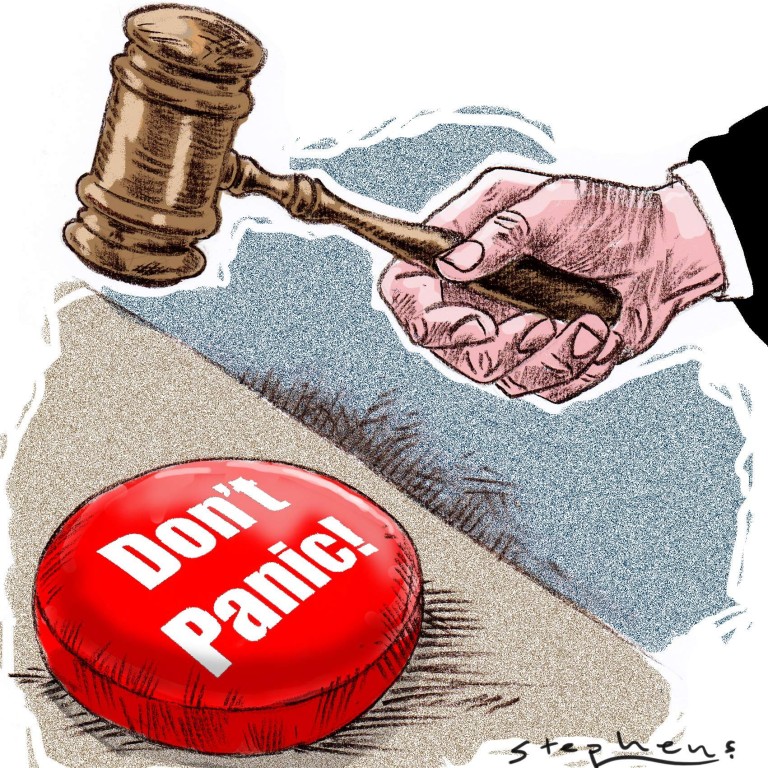
Hong Kong oath saga: common law arguments led to lawmakers’ disqualification, rather than Beijing’s ruling
Cliff Buddle says the legal position will be even clearer as other cases and appeals come before the court but, with a line now drawn, it’s time for cool heads on all sides to prevail

Few would have predicted the dramatic series of events which followed Yau Wai-ching and Sixtus Baggio Leung Chung-hang’s offensive and pro-independence remarks at the first meeting of the legislature on October 12.
The government swiftly filed a court action to have them disqualified. Beijing then issued a binding interpretation of the Basic Law to settle the matter before the judge had given his ruling. This prompted the filing of further cases brought by various groups and individuals challenging oaths taken by Chief Executive Leung Chun-ying and 16 other lawmakers, most of them pan-democrats.
Meanwhile, around 2,000 members of the legal profession staged a rare protest march, concerned that Beijing’s intervention undermined judicial independence.
Game changes in Hong Kong’s Legislative Council after ban of two localist lawmakers
When it came, the ruling by Mr Justice Thomas Au Hing-cheung was an anticlimax. He was bound by the National People’s Congress Standing Committee’s interpretation eight days earlier, which effectively compelled him to favour the government’s arguments in the case and disqualify the two lawmakers. The outcome was no surprise.
It should not be thought that the principle of non-intervention has somehow evaporated with this judgment
But the judge was at pains to demonstrate that he had reached his decision through the application of common law principles. He could have simply relied on the interpretation. Instead, Mr Justice Au acknowledged the need for him to follow the interpretation at the start of his judgment, but then quickly moved on to common law methods with which the courts are more familiar.
The judge made it clear that, with or without the interpretation, his decision would have been the same. The meanings he gave to the relevant Hong Kong laws, he said, “are reached by the application of common law principles of construction and supported by authorities, independent of the interpretation”.
This might come as some consolation to those concerned about an undermining of Hong Kong’s legal system. But it would have been better if the court had been left to rule on the case without its hands being tied by the interpretation. I wonder if Mr Justice Au was tempted to deliver his judgment earlier, in order to get in just before Beijing’s decision. The government’s lawyer seemed to urge him to take such a step.

Court ruling on oaths a welcome and valid clarification of the law
At the heart of the case was the question of whether the judiciary should get involved at all. Lawyers for the two legislators argued that their oaths and potential disqualification were matters for Legco itself to decide, not the courts.
Mr Justice Au held that judges have a responsibility to consider whether Legco’s actions are consistent with the Basic Law. He reached this conclusion by reference to legal precedents from Hong Kong, Australia, India and the UK.
It could probably have been settled in Legco, without the need for court cases or an interpretation from Beijing
He relied primarily on a Court of Final Appeal decision from 2014. In that ruling, the top court noted the separation of powers and the “established relationship” between the legislature and the courts. “This relationship includes the principle that the courts will recognise the exclusive authority of the legislature in managing its own internal processes in the conduct of its business, in particular its legislative business,” it said.
The top court added: “The important responsibilities of Legco, notably its law-making function, require, as with other legislatures, that it should be left to manage and resolve its own internal affairs, free from intervention by the courts and from the possible disruption, delays and uncertainties, which could result from such intervention.” However, the principle of “non-intervention” by the courts into Legco affairs was subject to constitutional requirements, it said.
In Hong Kong’s case, this means subject to the Basic Law. Mr Justice Au, in applying the top court’s decision, ruled he had the power to decide whether the two lawmakers should be disqualified. It should not be thought, however, that the principle of non-intervention by the courts in Legco affairs has somehow evaporated with this judgment. When there is an appeal, it will be interesting to see how the higher courts approach the question of where the boundary is to be drawn.

Disqualified Legco duo file court appeal against their dismissal
With further cases pending, there will be more judgments and the legal position will become clearer. Oaths taken by other lawmakers will be subjected to judicial scrutiny. The question to be asked, according to Mr Justice Au, is whether their conduct “objectively manifests itself as an intentional refusal” to take the required oath. On that basis, it is unlikely we will see mass disqualifications. One feature of the case before Mr Justice Au is that the two lawmakers concerned made no attempt to argue that their oaths were genuine (given their conduct and political stance, it would have been difficult for them to do so). Other lawmakers will be in a stronger position.
The whole affair has been a painful one. It could probably have been settled in Legco, without the need for court cases or an interpretation from Beijing. Now, we must wait for outstanding cases to be settled and, very likely, by-elections to be held.

Hong Kong legal experts split over court’s ruling in oath controversy
For Hong Kong to recover and get back to business, restraint is now needed on all sides of the political spectrum. If the interpretation is used to drive out pro-democracy legislators, to block radical candidates from standing in elections, to invite the courts to delve deeper into Legco’s affairs, and to restrict free speech, there will be no end to this controversy. The loser, ultimately, will be Hong Kong.
Beijing has made it clear it will not accept pro-independence forces in Legco. The actions of the two legislators in this case were stupid and provocative. They should not be repeated. But now that a line has been drawn, it is to be hoped that matters will rest there. The continued success of “one country, two systems” depends on it.
Cliff Buddle is the Post’s editor, special projects

